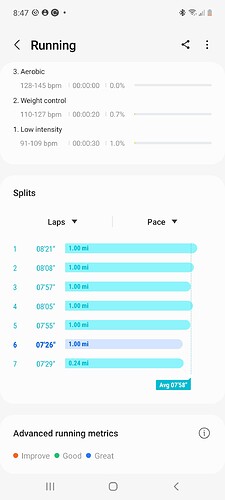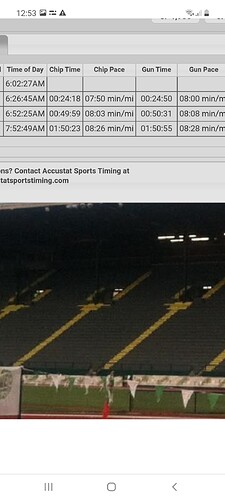only have a minute and this will be a dry post but in short I think @spidercrab is posting a lot of good stuff here. Imo the most common form mistake that runners make is overstriding. The best way to stop this—to run more efficiently with a more efficient stride length—is, a little weirdly maybe, to increase your cadence. For my own running, I get a little antsy when my cadence is below 180 strides/minute (which I count in my head as 90 because it’s easier just to count one leg). I think most runners who haven’t ever thought about this should initially shoot for anything like, eh, 174 and above, i.e. if you’re running at an easy pace and your left foot is hitting 87ish times in a minute then you’re more or less good to go. If you count and see that you’re at 83 or something then don’t try to fix it all at once, instead just try to slowly nudge your cadence up over weeks and months. When it’s dialed in then you should feel light on your feet and sort of quick and you shouldn’t be clomping around, good runners are generally quiet. But don’t cut your stride short just to hit a number—i.e. don’t understride either. Take your time and get to 174-180ish strides per minute, but do it while always checking in with yourself that you feel relaxed and natural. Yes your turnover will slow down a tiny bit at slower paces, but there actually isn’t a huge variation across paces; olympians running the mile and the marathon have roughly the same stride rates, it’s just their stride lengths that change.
Totally one zillion percent agree with spidercrab’s thoughts on making the (vast) majority of your runs slow and easy. This can be really tricky; it’s really tempting to get sucked into a mental merry-go-round of feeling like you’ll get more out of your regular workouts if you go faster and get more tired. But running is backwards that way: you’ll get better at running if most of your training is very easy than you will if the training is hard. We could talk about this for hours, but for runners building a base, most if not all of your runs should be truly easy. By easy I mean that you should be relaxed and comfortable, you should be able to listen to a podcast and concentrate on it and have a non-gaspy conversation with your dog and/or imaginary friend if you want. Sure your brain should be quietly focused on just the running sometimes (imo everyone should force themselves to do at minimum a half hour of weekly running with no audio happening), but keep things easy. A few years ago there was a trend in running where people were trying to only run three days/week and all three days were hard workouts. They weren’t totally wrong and there were some lessons to take away from their doomed experiment, but the main result was that they mostly ended up getting hurt or sick.
Fwiw I think that as runners get more experienced they become more likely to build their program around minutes spent running rather than miles covered. I think this is mostly a mental posture thing: arranging things by miles and paces tends to make people focus more on objectives & details, which are totally important, but at the day-to-day level they can be misleading. Shifting the focus to time spent running can tune some people more into how they’re actually feeling on the runs, which is a way more durable/trustworthy barometer of things and leads to a million other downstream benefits. Yeah it’s super necessary & good to set goals along the way and check them off, but tethering the goals to mileage can super easily spiral off into a smorgasbord of training nightmares.
In general the 80/20 thing seems good for running (80% of your total running as absolutely easy runs), but imo 80/20 is only a decent ratio for the periods when you’re actively training for something (that are generally 10-20 weeks long). If I’m just building a base then for me the ratio is more like 95/5. Again, it’s weird, but so many of the good training effects of running (e.g. more efficient body movement, better fat burning as opposed to carb burning, more energy-related enzymes and more mitochondria aka the powerhouses of the something something, so in other words a better ability to use oxygen e.g. more literal blood + more stroke volume + more capillaries that sprout and envelop your relevant muscles in a way that seems sort of enchanted + “better” blood in general i.e. more red blood cells to shuttle oxygen)…all these things are happening at the easy paces too. If you don’t balance your hard workouts with lots of easy stuff then you eventually you’ll overtrain, which you’ll experience as getting hurt or sick or just plain glum
Typical scenario: runner has a bad day or week and then they get bummed and they think they’ve blown their whole program, which makes them either blow off their next few workouts or alternatively to dig in ten times harder in their next few workouts, which then makes them get even more bummed and torpid, and then after two or three weeks of this they’ve given themselves all the excuses they need to bail. Totally understandable, but it’s too bad, because the truth is everyone has bad days running, it’s impossible not to. It’s partly a rando biochemical thing probably, sometimes bad days just plop in from the moon, no one knows why. Just don’t overreact to the occasional clunker and you’ll be fine. Successful training is much more about cultivating a habit over months than it is about any single thing that ever happens during those months. And again this works both ways: the line between being perfectly trained and being overtrained is crazy thin and once you’re even a little bit caught in the tractor beam of overtraining then it usually sucks you all the way down the drain, which is to say that there’s some inherent danger in getting too chipper about your good days too. So, steady as she goes and just keep showing up. Sorry I’m writing so much about this but man the surest way to burn out is to turn every workout into a race and/or some demonstration of will, instead you have to mentally shift your daily idea of toughness into being consistent.
About form in general, eh I dunno, my first thoughts are (1) run tall. All kinds of good things happen when you run tall. You don’t slouch and you don’t jut your head out and you don’t stick your butt out. No need to think about all this stuff piece by piece, just think run tall (2) run relaxed, i.e. relaxed and balanced and not feeling like you’re fighting physics, (3) for the last decade the world has been really obsessing about footstrike, heel-striking vs midfoot striking and so on, but tbh I wouldn’t lose too much sleep over it. The important thing is that your foot is landing more or less under your center of gravity and under your body. Don’t think about reaching out in front of you with your feet, instead think about pushing yourself harder on the ground, from behind you—when you drive yourself forward, it should feel like the energy and drive is happening behind you. (4) related: people in general don’t run with their butt muscles enough. Especially on hills, but on flats too. Unfortunately trying to train yourself how to habitually engage those muscles can be totally baffling and borderline impossible to describe in words. But if you wonder if you’re using your butt enough then you probably aren’t.
also totally agree with spidercrab about stretching / mobility stuff in general. And crosstraining. Another thing I’ll bet he’d tell his younger self is to add in regular rest weeks (where you dial things back a bit, seriously as often as every three to four weeks). In life by nature I’m not an especially conservative risk-averse person, and in sports I’m definitely not that way, but running is just weird. The main challenge is being consistent. Everyone everyone everyone gets hurt or burned out from running sometimes, there’s no dodging that, but by building a training program around being good to yourself and having discretion be the better part of valor most of the time, you give yourself the best chance to stick around and cultivate a potentially fun superhealthy habit while all your friends and family keep popping in and out like quantum beer foam. jesus this ended up being a long post, sorry just typing.


